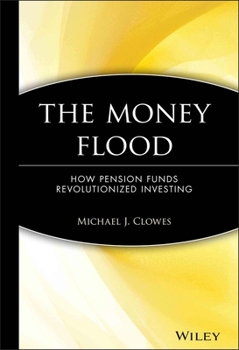The Money Flood: How Pension Funds Revolutionized Investing
Select Format
Select Condition 
Book Overview
Praise for Michael J. Clowes and the money flood
"What a fine book! As an active participant in the revolution in pension investing, I could almost feel the times and tides of the past half-century shifting beneath me. Mike Clowes's splendid and articulate tour through the era is destined to become a landmark on the bookshelves of everyone interested in this illuminating history of the past, as well as its portents of the future."-John C. Bogle, founder, The Vanguard Group
"The corporate pension fund ranks high among the spectacular financial innovations of the twentieth century. Mike Clowes has built a fascinating story about the impact of this flood of money on the theory and practice of investing, the financial markets, the labor force, corporate management, and the general economy. The far-reaching consequences of these changes make this authoritative and lively book must-reading for everyone."-Peter L. Bernstein, President, Peter L. Bernstein, Inc., author, Against the Gods: The Remarkable Story of Risk
"The definitive history of the rise of pension fund capitalism in America."-Keith Ambachtsheer, President, KPA Advisory, author, Pension Fund Excellence: Creating Value for Shareholders
"Beautifully written, broad in coverage of all the best parts of a great American story, Mike Clowes's new book gives us an easy-to-read and easy-to-enjoy explanation of who did what and when in the investment revolution of the past half-century."-Charles D. Ellis, Partner, Greenwich Associates, author, The Investor's Anthology: Original Ideas from the Industry's Greatest Minds
"What a fine book! As an active participant in the revolution in pension investing, I could almost feel the times and tides of the past half-century shifting beneath me. Mike Clowes's splendid and articulate tour through the era is destined to become a landmark on the bookshelves of everyone interested in this illuminating history of the past, as well as its portents of the future."-John C. Bogle, founder, The Vanguard Group
"The corporate pension fund ranks high among the spectacular financial innovations of the twentieth century. Mike Clowes has built a fascinating story about the impact of this flood of money on the theory and practice of investing, the financial markets, the labor force, corporate management, and the general economy. The far-reaching consequences of these changes make this authoritative and lively book must-reading for everyone."-Peter L. Bernstein, President, Peter L. Bernstein, Inc., author, Against the Gods: The Remarkable Story of Risk
"The definitive history of the rise of pension fund capitalism in America."-Keith Ambachtsheer, President, KPA Advisory, author, Pension Fund Excellence: Creating Value for Shareholders
"Beautifully written, broad in coverage of all the best parts of a great American story, Mike Clowes's new book gives us an easy-to-read and easy-to-enjoy explanation of who did what and when in the investment revolution of the past half-century."-Charles D. Ellis, Partner, Greenwich Associates, author, The Investor's Anthology: Original Ideas from the Industry's Greatest Minds
Format:Hardcover
Language:English
ISBN:0471384836
ISBN13:9780471384830
Release Date:June 2000
Publisher:Wiley
Length:320 Pages
Weight:1.35 lbs.
Dimensions:1.1" x 6.3" x 9.3"
Customer Reviews
1 rating
A Fascinating Read about the Financial Revolution
Published by Thriftbooks.com User , 24 years ago
In The Money Flood, Michael Clowes, Editorial Director of Pensions & Investments, presents an instructive and entertaining overview of the pension fund industry and its effects on financial markets. The book begins with the National Labor Relations Board's 1948 holding that contract negotiations between employers and employees had to consider pensions-a watershed decision, Clowes argues, because it encouraged the growth of pensions funds and thus fostered their largely beneficial effects on markets and the economy. In the 50 years since, pension assets grew from $14.3 billion to almost $9 trillion, and the business itself matured from a small-club dominated by a few large corporations, bank trust departments, and insurance companies invested mostly in bonds to a diversified industry encompassing money managers, consultants, and mutual funds with investments in equity, real estate, commodities, start-up ventures, and overseas markets.Clowes' chronological approach to this story is held together by several major themes. Primary, of course, is the fact that the growth in pension funds raised a vast flow of capital and unleashed it into America's markets. However, the effects of this new capital might not, Clowes suggests, have been as salutary, had not this flow of money encouraged the development of the investment technology and the investment professionals to manage it.The "professionalization" of pension fund management had at least two beneficial effects. First, it allowed for the spread of pension money beyond bonds into more growth-building investments, including equity and venture capital. Second, it allowed for the spread of capital beyond the corporations that actually sponsored the pension funds. Clowes makes the interesting point that this has not been the case in Japan or Germany, say, where pools of pension money (smaller to begin with) have been generally confined to the sponsoring company and its affiliates, hence have not generated the wealth, for pension beneficiaries or the overall economy, that America's system has.The book highlights the major turning points and participants in the development of the industry. These include the work of Harry Markowitz, Bill Sharpe, Fischer Black and others in financial technology; the efforts of Meyer Melnikoff at Prudential and Anders Voorhees at U.S. Steel to expand pension investing to stock; George Russell, Jr. and the development of the pension consulting business; Harrison Smith and the early moves to international pension investing at Morgan Guaranty; David Bronner's experiments with social investing at the Alabama Retirement System; and John Bogle and the growth of mutual funds.A leading role throughout is played by the U.S. government. Sometimes it comes out as hero, as with the Employee Retirement Income Security Act of 1974, which Clowes sees as enhancing the good effects of pension investing by replacing the old "prudent man" standard with a "





